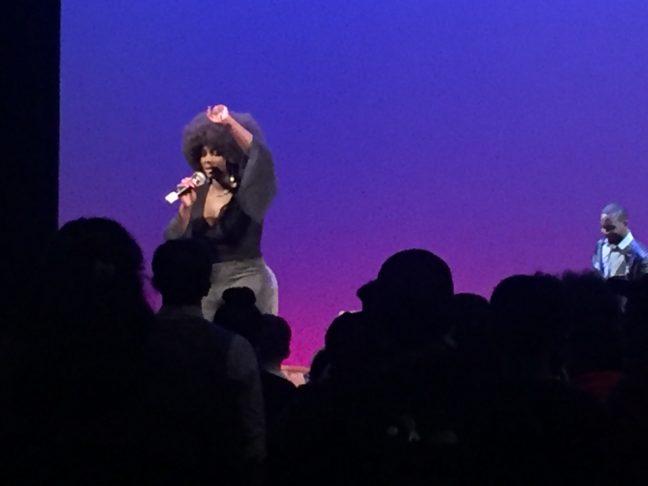Amara La Negra discussed her struggles as an entertainer in the Afro-Latin community Thursday in University of Wisconsin’s Memorial Union.
La Negra is a philanthropist, model and actress, who appears in the show “Love and Hip-Hop: Miami.”
In Latin, “Amara” means “eternal beauty,” La Negra said. The name also means “cinnamon skin,” which she said makes it the perfect name for herself.
La Negra grew up in the entertainment business. She said her mom entered her in beauty pageants as a kid, and she finished her first pageant at age one. La Negra worked as a backup dancer, acted in commercials for Disney, sung and modeled — all at 27-years-old. La Negra credits the success to her mother.
“Thanks to [my mom], I’m here today,” she said.

Emilie Burditt/The Badger Herald
La Negra said with her social media following she can make her voice heard. She wishes more artists would be more vocal about issues that impact in their communities.
Anyone can make a difference, La Negra said. She explained people can unite their forces and their knowledge through peaceful means to make a change.
“You have to be a part of the movement,” La Negra said. “People will listen if you talk.”
La Negra said wishing for change is not good enough. She thinks social media has made people lazy, but she thinks the platform can be used thoughtfully. For example, La Negra said it is okay to complain about President Donald Trump, but asked, “What are we doing to stop it?”

Emilie Burditt/The Badger Herald
“If you want to see a change you need to be part of the change,” La Negra said.
La Negra makes sure to give everything her all, partly because she said women like her aren’t given the same opportunities because of their looks. For a long time, La Negra hated her “thunder thighs” and “big butt.” She said she wanted to look like the models in the magazines, meaning she wanted to be long, thin and have a flat stomach.
It’s about building confidence, La Negra said. For La Negra, she said her hair is her energy and her crown. She changes it a lot, but only lets her mom touch it. La Negra said it’s not about the products, it’s about the energy. She doesn’t care if there are a few hairs out of place — she likes it for how it is.
La Negra overcame her insecurity — although she mentioned it still exists — by accepting who she is. That meant accepting her curves and the texture of her hair. La Negra said if someone says they don’t like her, she thinks “I didn’t ask you.”
The woman of many talents won’t ask anyone for a comb or shampoo. For almost everything, La Negra feels she can do it herself. She said she’s a self-starter and brought her own success.
“Stay in your lane,” La Negra said.“I got this.”
La Negra said it’s easy to lose oneself and their identity by caring about what people think, so she tries not to. She also said we don’t always know what someone has experienced, so it’s important to “breathe it out,” if someone is ignorant.
Christine Blasey Ford’s bravery, intentions shows importance of women supporting other women
A lot of negative feedback La Negra receives revolves around the color of her skin. La Negra said colorism still exists, and with everyone having access to smartphones, hurtful people have the power to exploit it on social media.
La Negra said she’s been told — sometimes through social media comments on her work — that she’s too black to be Latina or too Latina to be black. She’s even been told she couldn’t be both.
But La Negra said she knows who she is, which is both black and Latina. She told the audience she has no question about this. La Negra doesn’t care about society’s beauty standards — she knows she’s beautiful.
“If nobody tells you you’re beautiful, you better know that you are,” La Negra said.
At the conclusion of her on-stage interview, La Negra gave an appropriate performance for the audience, singing a few of her songs, including “Insecure.” There was a backdrop for the audience to see the lyrics, and she encouraged everyone to stand and dance with her — embodying the inclusive spirit she’d preached all night.


